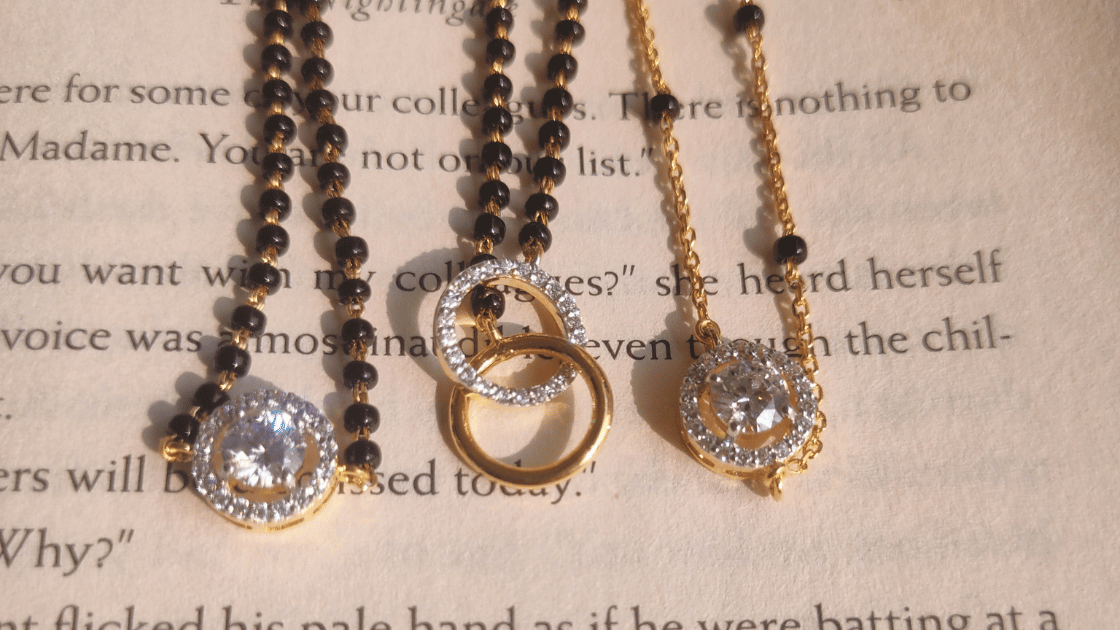In the world of jewelry, few pieces carry as much cultural significance as the Mangalsutra bracelet. From its roots in ancient customs to its modern interpretations, this emblematic accessory remains a timeless symbol of marriage and commitment. As a purveyor of silver Mangalsutra bracelets, with options including gold plating, delving into the intricacies of this adornment is not only fascinating but essential for understanding its allure.

Definition of a Mangalsutra Bracelet
Mangalsutra bracelet is a sacred piece of jewelry worn by married women in many South Asian cultures, signifying marital status and symbolizing the union between husband and wife.
Historical Significance
With origins dating back centuries, the Mangalsutra bracelet has deep-rooted cultural and religious significance, embodying traditions passed down through generations.
Modern Adaptations
While retaining its traditional essence, the Mangalsutra bracelet has evolved to encompass contemporary designs and materials, reflecting changing tastes and lifestyles.
Cultural Significance
Symbol of Marriage
The Mangalsutra bracelet is more than just an accessory; it is a tangible symbol of the sacred bond between spouses, representing love, respect, and commitment.
Religious Importance
In Hindu culture, the Mangalsutra holds immense religious significance, believed to protect the marriage from evil forces and ensure the well-being of the husband.
Social Significance
Beyond its religious connotations, the Mangalsutra bracelet serves as a marker of social status and marital fidelity, commanding reverence in traditional societies.
Design and Materials
Traditional vs. Modern Designs
From intricately designed gold chains to sleek contemporary bracelets, the Mangalsutra comes in a variety of styles, catering to diverse tastes and preferences.
Symbolic Elements
Each element of the Mangalsutra bracelet, from the pendant to the beads, carries symbolic meaning, representing aspects of marital harmony and prosperity.
Materials Used
While traditionally crafted from gold and black beads, modern Mangalsutra bracelets may incorporate a range of materials, including silver, diamonds, and gemstones, offering versatility in both design and budget.
Wearing Etiquette
Meaningful Placement
The Mangalsutra bracelet is worn close to the heart, symbolizing the deep bond between spouses and serving as a constant reminder of marital vows.
Occasions to Wear
While typically worn daily, the Mangalsutra bracelet holds special significance during religious ceremonies, festivals, and auspicious occasions, enhancing its symbolic value.
Maintenance Tips
To preserve its luster and symbolism, regular cleaning and proper storage are essential for Mangalsutra bracelets, ensuring they remain cherished heirlooms for generations to come.
Symbolism and Rituals
Unity and Bonding
The act of tying the Mangalsutra during wedding ceremonies symbolizes the union of two souls, marking the beginning of a lifelong journey together.
Wedding Ceremonies
In traditional Hindu weddings, the Mangalsutra ceremony holds profound significance, representing the groom's commitment to protect and cherish his bride.
Cultural Variations
While the essence of the Mangalsutra remains consistent across regions, variations in design and rituals reflect the diverse cultural tapestry of South Asia, enriching its symbolism and significance.
Evolution of Mangalsutra Bracelet
Historical Evolution
From simple black beads to ornate gold chains, the Mangalsutra bracelet has evolved over centuries, adapting to changing cultural norms and artistic influences.
Contemporary Trends
In the modern era, Mangalsutra bracelets have undergone a revival, with designers infusing traditional motifs with contemporary aesthetics, appealing to a new generation of brides.
Global Influence
Beyond South Asia, the allure of the Mangalsutra bracelet has transcended cultural boundaries, captivating audiences worldwide and inspiring diverse interpretations of marital symbolism.
Fashion and Style
Versatility in Fashion
The Mangalsutra bracelet seamlessly blends tradition with fashion, offering a timeless accessory that complements both traditional attire and modern ensembles.
Celebrities and Trends
Influential figures in the worlds of fashion and entertainment have embraced the Mangalsutra bracelet, sparking trends and redefining its role as a symbol of style and sophistication.
Cultural Appropriation
While the Mangalsutra bracelet has gained popularity beyond its cultural origins, it is essential to respect its sacred significance and avoid appropriating its symbolism for fashion trends devoid of cultural understanding.
Cultural Preservation
Importance in Heritage
As custodians of cultural heritage, preserving the tradition of the Mangalsutra bracelet is essential for safeguarding the identity and values of South Asian communities.
Revival Efforts
Amidst changing societal norms, grassroots initiatives and advocacy efforts are underway to revive interest in traditional Mangalsutra designs, ensuring their continued relevance in modern times.
Cultural Identity
The Mangalsutra bracelet serves as a potent symbol of cultural identity, fostering a sense of pride and belonging among those who cherish its traditions and symbolism.
Significance Beyond Marriage
Symbol of Commitment
While traditionally associated with marriage, the Mangalsutra bracelet also symbolizes broader concepts of commitment, loyalty, and devotion in personal relationships.
Empowerment and Independence
For many women, wearing the Mangalsutra bracelet is a source of empowerment, representing their autonomy and agency within the context of marriage and society.
Gender Equality
As attitudes towards marriage and gender roles evolve, the Mangalsutra bracelet serves as a reminder of the importance of equality and mutual respect in partnerships, transcending traditional notions of duty and obligation.
Conclusion
Recap of Cultural and Symbolic Importance
In conclusion, the journey through the realm of Mangalsutra bracelets has been an illuminating exploration of culture, tradition, and symbolism. We've traced the origins of this timeless adornment, from its historical roots to its modern interpretations, uncovering layers of meaning woven into its very essence. The Mangalsutra bracelet serves as a beacon of cultural identity, symbolizing the sacred bond between spouses and the enduring values of love, commitment, and respect.
Personal Reflections
As we reflect on the significance of Mangalsutra bracelets, it's hard not to be moved by the depth of emotion and tradition they represent. Each bracelet tells a story—a story of love, of family, of heritage. It is a tangible reminder of the vows exchanged and the journey embarked upon together. For those who wear it, the Mangalsutra bracelet is more than just an accessory; it is a cherished keepsake, carrying with it the memories and blessings of generations past.
Future Prospects and Trends
Looking ahead, the future of Mangalsutra bracelets is as bright as ever. With a new generation of designers infusing fresh creativity into traditional designs, we can expect to see even more innovative interpretations of this iconic piece of jewelry. As cultural boundaries continue to blur and global connections deepen, the appeal of Mangalsutra bracelets is sure to reach new heights, captivating audiences around the world with their timeless beauty and profound symbolism.
In the end, whether crafted from silver or adorned with gold plating, the Mangalsutra bracelet remains a symbol of enduring love and cultural heritage. It is a testament to the rich tapestry of traditions that bind us together, transcending time and space to unite hearts and minds in a celebration of life's most precious moments. As we embrace the beauty of Mangalsutra bracelets, we also embrace the values they represent—values of love, unity, and commitment—that will continue to guide us on our journey through life.




0 comments